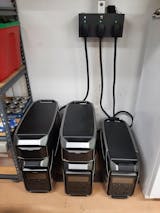
Best Portable Generators for RVs in 2025
Whether you’re boondocking in the desert or plugged into shore power at a campground, reliable electricity is essential for a comfortable RV lifestyle. From keeping the lights on to running your fridge, air conditioner, and microwave, having access to dependable power can make the difference between a smooth journey and a frustrating detour.
Portable generators provide the freedom to camp off-grid, explore remote areas, and maintain modern comforts anywhere your travels take you. They offer RVers a flexible power solution that's both rugged and reliable. Whether you're a weekend warrior or a full-timer, a quality fuel-based portable generator can become one of the most important pieces of gear in your setup.
Before diving into the best models of 2025, it’s helpful to understand the types of generators available and what features matter most.
Types of Portable Generators for RVs
Conventional Generators
Traditional or “conventional” portable generators use a mechanical alternator to produce electricity. They tend to be more affordable and can offer higher power output, but they’re generally louder and bulkier than inverter models. These are ideal for powering heavy-duty equipment or multiple appliances at once—though you may need to install additional noise shielding if you are staying at a campground that has noise level rules.
Inverter Generators
Inverter generators are designed to produce clean, stable power that's safe for sensitive electronics like laptops, TVs, and mobile devices. They’re typically more fuel-efficient, significantly quieter, and lighter in weight. This makes them particularly popular with RVers who value quiet operation and portability.

7 Things to Consider When Choosing an RV Generator
Before purchasing a portable generator for your RV, keep these key considerations in mind:
1. Power Output (Wattage Needs)
Think about what you plan to run. A rooftop A/C might need 2,000–3,000 watts to start, while lights and small appliances use much less. Match the generator’s continuous (running) and surge (starting) wattage to your RV’s load requirements.
2. Noise Level
Campgrounds often have noise restrictions, and nobody wants to disturb the peace of nature. Look for inverter models or those rated for quiet operation—typically under 60 decibels (dBA).
3. Fuel Type and Efficiency
Fuel options include gasoline, propane, and natural gas. Dual-fuel and tri-fuel models allow you to switch depending on availability and price. Propane burns cleaner, while gasoline offers convenience—but comes with that lovely gasoline smell.
4. Size and Portability
Consider your RV’s storage capacity and weight limits. Some high-output generators are heavy, while compact inverter models are ideal for travel trailers or solo campers.
5. Runtime
Longer runtimes mean fewer fuel stops. Look at the generator’s fuel tank size and efficiency. Many models advertise runtimes at 25% or 50% load.
6. Parallel Capability
Some inverter generators can be connected in parallel to double their output—great for occasional high-demand use without hauling a heavy-duty unit all the time.
7. Price Point
There’s a wide range of price options depending on power output, features, and fuel flexibility. Stick to what aligns with your actual usage patterns.
Top Portable Generators for RVs in 2025
Each of the following fuel-based generators is available at Outbound Power and has been handpicked for quality, value, and RV readiness.

🏆 Best Overall Generator
Firman T07573 Tri-Fuel 7500W/9400W Portable Generator
The Firman T07573 offers true fuel flexibility with three fuel options—gasoline, propane, or natural gas. It delivers 7,500 running watts and 9,400 peak watts, making it ideal for most RV power needs. With a 30A RV outlet, electric start, and rugged wheels, it's designed for RVers who want one generator that can go anywhere and do it all.

⚡ Best High-Capacity Generator
DuroMax XP16000iH Dual Fuel Portable Inverter Generator
The DuroMax XP16000iH is a heavy-duty, inverter-style generator with dual-fuel operation. It delivers a massive 13,000 running watts and 16,000 peak watts—enough to run your entire RV and then some, including air conditioners. Even with the massive power output, it features clean inverter output, remote start, and CO monitoring for safety.

⚖️ Best Mid-Range Generator
DuroMax XP4500iH Dual Fuel Portable Inverter Generator
If you're looking for the sweet spot between compact convenience and high-powered performance, the DuroMax XP4500iH hits the mark. This dual-fuel inverter generator offers 3,600 running watts and 4,500 peak watts, making it perfect for mid-sized RVs, travel trailers, or van lifers who want quiet, efficient, and flexible power.

💰 Best Budget-Friendly Choice
DuroStar DS13000MX Dual Fuel Portable Generator
With 10,500 running watts and 13,000 starting watts, the DuroStar DS13000MX provides serious value. At just $999, this dual-fuel generator has a 50A outlet, push-button start, steel frame, and plastic hub wheels, all built for demanding environments—perfect for budget-conscious RVers who don’t want to compromise on output.

🤫 Best Generator for Quiet Operation
Cummins Onan P4500iDF Dual Fuel 3700W/4500W Portable Generator
Designed for quiet, reliable performance, the Cummins Onan P4500iDF generator runs on either gasoline or propane. With 3,700 running watts and 4,500 peak watts, it's ideal for most RV setups. The unit features electric start, a telescoping handle for portability, and a noise rating as low as 52 dBA—making it one of the quietest generators in its class.

🧳 Best Compact Model
EcoFlow Dual Fuel Smart Generator 3000
Smart, portable, and easy to integrate into solar or battery-based systems, the EcoFlow Smart Generator 3000 is perfect for RVers who prioritize compact design and digital convenience. It delivers 1,800 running watts and 3,000 peak watts, and perhaps the best part—it can be easily monitored and controlled via the EcoFlow smartphone application.
A fuel-based portable generator is one of the smartest investments an RV traveler can make in 2025. Whether you prioritize power, portability, or quiet operation, there’s a model that fits your lifestyle.
Still Need Help Selecting a Portable Generator for Your RV?
Reach out to our friendly portable power experts and we'll be happy to help!
Toll-free & text: 888-976-5443
Email: support@outboundpower.com


